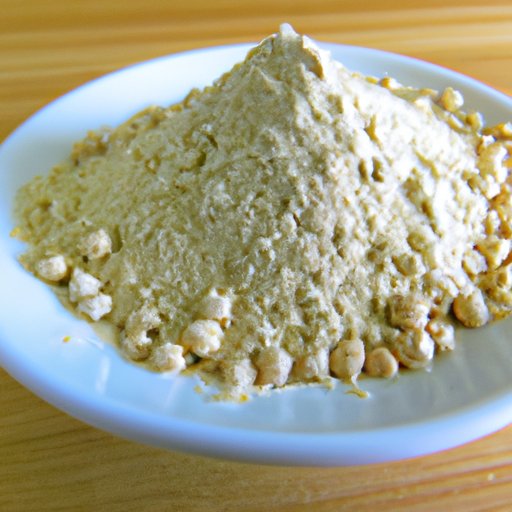
Is Chickpea Flour Gluten-Free?
Chickpea flour, known by many names, including garbanzo flour, gram flour, or besan, is a versatile ingredient used in many cuisines worldwide. It’s a common ingredient in Middle Eastern, Indian, and Mediterranean cooking and can be used to make everything from savory dishes to sweet treats. However, there is a controversy surrounding its gluten-free status. In this article, we’ll explore whether chickpea flour is gluten-free or not and provide tips on how to incorporate it into a gluten-free diet.
The Lowdown on Chickpea Flour: Gluten-Free or Not?
The debate about chickpea flour’s gluten-free status centers around the possibility of cross-contamination in processing facilities. While chickpea flour itself doesn’t contain gluten, people with celiac disease or gluten intolerance may be at risk of exposure due to cross-contamination during processing and packaging. Some brands’ facility may also process wheat, barley, or rye, which are gluten-containing ingredients.
According to the Food and Drug Administration (FDA), producers can only describe their products as gluten-free if it contains less than 20 parts per million (ppm) of gluten, which is a small enough amount to be considered gluten-free. Some brands that process chickpea flour and other flours in a dedicated gluten-free facility produces chickpea flour under the gluten-free label. However, different brands have varying production methods and guidelines, so it’s essential to read the label to determine if chickpea flour is manufactured in a gluten-free facility.
There are also scientific studies that support chickpea flour as a safe gluten-free alternative. One research published found that gram flour could be a viable substitute for wheat flour in gluten-free diets as it showed no adverse side effects in individuals with celiac disease.
It’s important to clarify that while chickpea flour doesn’t naturally contain gluten, it can still pose a risk for people with celiac disease or gluten intolerance. Therefore, it’s crucial to pay attention to the labels and look for brands that have strict gluten-free guidelines.
Going Gluten-Free with Chickpea Flour
Chickpea flour is a fantastic gluten-free alternative to traditional flours like wheat flour. It boasts a unique flavor profile and provides various health benefits. One significant advantage is that it’s packed with protein and fiber, making it a more filling and satisfying option than other gluten-free flours. Chickpea flour has a nutty, earthy flavor and a slightly grainy texture, making it a versatile ingredient for both sweet and savory dishes.
These are some delicious dishes you can prepare with chickpea flour:
- Savory Chickpea Pancakes: Chickpea flour blended with herbs, spices, and water to make batter, then pan-fried until golden and crispy.
- Flatbread: Chickpea flour, olive oil, water, and salt, mixed to make a dough, then rolled out and cooked like traditional flatbread.
- Pizza Crust: Chickpea flour and water mixed to make a dough that’s then formed into a crust and topped with your favorite pizza toppings.
From Hummus to Baked Goods: Maximizing the Versatility of Chickpea Flour
Chickpea flour isn’t just for savory dishes; it can also be used in many baked goods, including muffins, brownies, and cakes. It’s an excellent replacement for wheat flour in gluten-free baking because of its high protein content, which helps to keep baked goods moist and tender.
There are different types of chickpea flour, including coarse and fine grinds, depending on how the flour is processed. Coarser grinds are ideal for making crispy items like pakoras, while fine grinds are perfect for baked goods as they produce a smoother texture and finer crumb.
Gluten-Free Cooking with Chickpea Flour: Tips and Tricks
The following are essential tips for cooking with chickpea flour:
- When substituting chickpea flour for wheat flour in recipes, use a 1:1 ratio for best results.
- Chickpea flour can be dense, so it’s essential to sieve or sift before use to avoid lumps and clumps.
- To avoid bitterness, roast the flour before use. Place in a dry skillet over medium heat and stir for three to five minutes until it turns golden brown.
- Pair with flavorful ingredients to balance the nutty, slightly bitter taste.
- Chickpea flour batter can be thicker than traditional batters, so it’s important to rest the batter before cooking. Thirty minutes should be a good resting time or overnight in the fridge.
- Chickpea flour items cook faster than wheat-based ones, so it’s important to keep an eye on them to avoid burning.
Beyond Gluten: The Nutritional Benefits of Chickpea Flour
Chickpea flour isn’t just a gluten-free alternative to wheat flour; it’s also incredibly nutritious. It’s loaded with fiber, protein, iron, and vitamin B-6, making it a healthy option for those with gluten intolerance or celiac disease. Fiber promotes healthy digestion and regular bowel movements, and protein is essential for muscle growth and repair. Iron helps prevent anemia, while vitamin B-6 regulates cell metabolism and immune function.
Studies also suggest that incorporating chickpea flour into your diet may have some health benefits. A 12-week study published in 2016 found that consuming chickpea flour improved insulin levels and glycemic control in people with type 2 diabetes. Another study found that consuming chickpeas and other legumes regularly can help lower the risk of heart disease, cancer, and other chronic conditions.
Conclusion
In conclusion, chickpea flour is a fantastic gluten-free alternative for people who suffer from gluten intolerance or celiac disease. While there is debate on its gluten-free status due to the possibility of cross-contamination, studies and strict labeling guidelines support it as a safe option. Chickpea flour is a versatile ingredient that can be used in various dishes, from savory to sweet. It’s packed with fiber, protein, iron, and other essential nutrients that promote healthy digestion and overall health. Try incorporating chickpea flour into your diet today.




